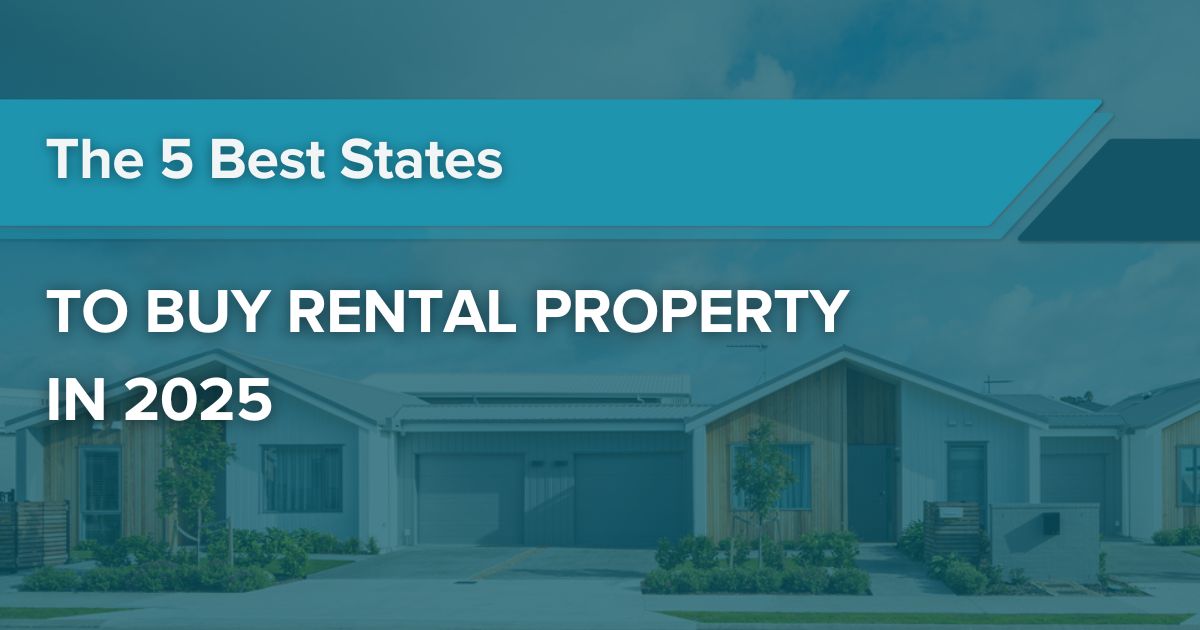As a real estate investor, you want to buy rental property where it will generate the most return. However, the most profitable rental markets can change over time. That’s why we’ve ranked the top five states for buying rentals in 2025.
What Makes a State Favorable to Buying Rental Property?
Before diving into the list, here are some of the top factors that determine whether a state is favorable to rental investing:
Median rental yield
Rental yield measures a property’s annual rental income as a percentage of its value (annual rent / property value = rental yield). The higher the rental yield, the more profitable the investment.
Vacancy rate
Vacancy rate is the percentage of rental units that are unoccupied in a given area (vacant units / total units = vacancy rate). A low vacancy rate means there is strong demand for rentals.
Population growth
Population growth refers to the rate at which the population is growing in a given timeframe (shown as a percentage). A fast-growing population increases housing demand, which can lead to lower vacancy rates and higher rents.
Percentage of renters
Residents generally fall into two categories: renters and homeowners. The higher the percentage of renters, the more potential tenants you can rent to.
Cost of living
Cost of living is the amount of money needed to cover basic expenses, such as housing, food, healthcare, etc. A lower cost of living tends to attract more renters.
Landlord-friendly laws
State laws regarding rent control, evictions, late fees, etc. can vary widely. Some state laws favor landlords more than others.
Now without further ado,
Here are the five best states to buy rental property in 2025:
1. Texas
| Median rental yield | 6.31% |
| Vacancy rate | 9.2% |
| Population growth | 4.7% |
| Percentage of renters | 37.6% |
| Cost of living index | 92.6 |
| Landlord-friendly score | 62.5/100 |
Texas tops the list for buying rental property in 2025. Out of all fifty U.S. states, it has the second-largest population (over 30 million), and it’s still growing. Between April 2020 and July 2023, it grew by 4.7%, faster than 47 other states.
Part of what attracts new residents is Texas’s thriving economy. In 2023, it had the second-largest GDP of any state (over $2 trillion). Meanwhile, the cost of living is relatively low.
Finally, it’s hard to beat Texas’s median rental yield of 6.31%. This means the median $500,000 property can generate about $31,550 in annual rental income.
2. Georgia
| Median rental yield | 5.96% |
| Vacancy rate | 8.3% |
| Population growth | 2.9% |
| Percentage of renters | 35% |
| Cost of living index | 91.5 |
| Landlord-friendly score | 75/100 |
Georgia offers both high rental returns and landlord-friendly laws. For example, Georgia bans rent control at the state level and places no limits on security deposits or fees, giving landlords the flexibility to run their businesses as they see fit. Meanwhile, Georgia has a median rental yield of 5.96% and a healthy 8.3% vacancy rate.
Furthermore, the state continues to attract renters with affordable housing and job opportunities. Atlanta, the state capital, is home to 31 500/1000 company headquarters and over 200 Inc. 5000 companies, including Coca-Cola Company, Delta Air Lines, and The Home Depot.
3. Arkansas
| Median rental yield | 6.41% |
| Vacancy rate | 11.1% |
| Population growth | 1.9% |
| Percentage of renters | 33.8% |
| Cost of living index | 89.0 |
| Landlord-friendly score | 87.5/100 |
Arkansas is a great market for first-time rental investors. Not only does it tie with West Virginia for the most landlord-friendly U.S. state but the median home value is just $162,400, creating a low barrier to entry.
That’s not to say you can’t also make a great return. The median rental yield is still 6.41%, the fourth highest nationwide.
Renters flock to Arkansas for its natural beauty (its nickname is “The Natural State”), low cost of living (it ranks seventh across all fifty states), and manufacturing and agricultural industries. The state is home to Walmart, Tyson Foods, and Kroger (among other big employers).
4. Oklahoma
| Median rental yield | 6.57% |
| Vacancy rate | 8.5% |
| Population growth | 2.4% |
| Percentage of renters | 34.1% |
| Cost of living index | 87.9 |
| Landlord-friendly score | 47.5/100 |
Oklahoma has the third-highest median rental yield of any state (6.57%). This means the median $170,500 home still generates an impressive $11,208 in annual rent.
In addition, Oklahoma has a relatively low 3.3% unemployment rate compared to the national 4.1% average (as of October 2024) and ranks fourth nationwide for the lowest cost of living.
Ultimately, the state’s robust economy and affordable housing help attract renters and keep current residents in better financial health, leading to fewer vacancies and late payments.
5. North Carolina
| Median rental yield | 5.58% |
| Vacancy rate | 7.6% |
| Population growth | 3.8% |
| Percentage of renters | 33.8% |
| Cost of living index | 97.6 |
| Landlord-friendly score | 75/100 |
North Carolina is one of the fastest-growing U.S. states. This is partly due to the state’s “Research Triangle,” a research park home to about 4,000 tech and 600 life science companies.
As companies like Apple, Meta, and Amazon grow their operations here, demand for rental housing will increase, creating stable investments for landlords. Consider buying rental property in Charlotte, Raleigh, Durham, and other fast-growing North Carolina cities.
Invest in Rental Property with ABL
No matter where you decide to buy rental property in 2025, ABL can help. Our private-money rental loans offer LTVs as high as 80% with as few as zero points. Contact us today to learn more or see if you pre-qualify!
Methodology
To determine the top states for buying rental property in 2025, we ranked all fifty states according to their median rental yield, vacancy rate, population growth, percentage of renters, cost of living, and landlord-friendly laws. Each category was weighted equally to arrive at a composite score for each state.
We used the following data sources:
- Median rental yield: U.S. Census Bureau’s Median gross rent, 2018-2022 and Median value of owner-occupied housing units, 2018-2022
- Vacancy rate: U.S. Census Bureau’s 2023 Housing Vacancies and Homeownership Statistics
- Population growth: U.S. Census Bureau’s Population, percent change – April 1, 2020 (estimates base) to July 1, 2023
- Percentage of renters: U.S. Census Bureau’s Owner-occupied housing unit rate, 2018-2022
- Cost of living: Missouri Economic Research and Information Center’s Cost of Living Data Series
- Landlord-friendly score: SparkRental’s State Landlord-Tenant Law Rankings







0 Comments